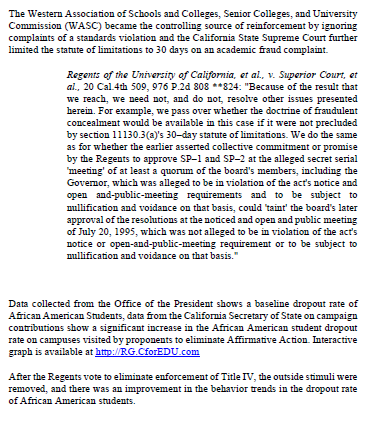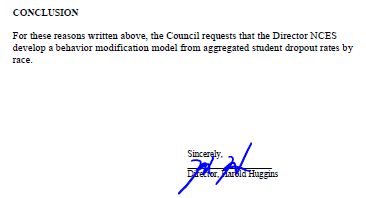IPEDS 2016-2019 Responses to 30-day Public Comments
IPEDS 2016-2019 Responses to 30-day Public Comments.docx
Integrated Postsecondary Education Data System (IPEDS) 2016-2019
IPEDS 2016-2019 Responses to 30-day Public Comments
OMB: 1850-0582
Public Comments Received During the 30-day Comment Period and NCES Responses
July 2016
Integrated Postsecondary Education Data System (IPEDS) 2016-19
ED-2016-ICCD-0020 Comments on FR Doc # 2016-14937
Comments related to OM
Comments number 71, 72, 75, 76
Document: ED-2016-ICCD-0020-0071
Name: Anonymous Anonymous
I would like to comment on the burden and inconsistency of asking for outcome measures by Pell recipients. First, for the current disclosure mandate for completion/grad rates by Pell, we have always followed the NPEC guidance here: https://nces.ed.gov/pubsearch/pubsinfo.asp?pubid=2010831rev It says: "Students are to be considered to have received a grant or loan if they received it for the period used in determining the cohort - fall term or full year." Asking institutions to now, instead, report by receiving Pell at any time during enrollment conflicts with that. What institutions disclose might now be different from what IPEDS is mandated to collect and post. Throw in the fact that IPEDS Fin Aid survey asks for aid awarded and you now appear to be asking for Pell disbursed, I just think you are asking for plenty of confusion and inaccurate reporting. Further, the Outcome Measures survey is becoming a huge burden to institutions. If the plan is to take the current 4 cohorts and break those out by Pell status so we now have 8 cohorts, I am starting to wonder if a unit-record level database is better here, even though I have always been against one. That is, what happens when you want to then layer that with subsidized Stafford loan status, sex, and/or race? Or, you all take another stab at calculating Pell completion rates from the NSLDS and Clearinghouse data by getting institutions to clean up their Clearinghouse data. We, for one, did find a problem with our coding of graduated status with Clearinghouse and corrected it so that in the future, data matched from NSLDS to Clearinghouse should produce accurate rates for our institution. Last, financial aid offices will have to be involved in OM reporting and I am not sure they all have the ability to easily or quickly report aid data from 6, 8, or 10 years ago. This might be ancient history to many offices. It will involve significant resources and time at many institutions, especially for those using separate fin aid and enrollment systems.
Document: ED-2016-ICCD-0020-0072
Name: Anonymous Anonymous
If Pell vs. non-Pell is added, then that would rule out automating the report because basically a list of IDs would have to be sent to Financial Aid, and they would have to identify each student as Pell or non-Pell.
Document: ED-2016-ICCD-0020-0075
Name: Jessica Sharkness
I am concerned about the definition of "Pell grant recipient" that is proposed. On page 6 of supporting statement A, the definition for Pell grant recipient is given as anyone "who received a Pell Grant at any time over the 8-year period." This differs from how we have historically been defining Pell grant cohorts, which is by Pell status during the *first semester* at the institution (as NPEC describes it, "Students are to be considered to have received a grant or loan if they received it [for] the period used for determining the cohort fall term or full year." See http://nces.ed.gov/pubs2010/2010831rev.pdf, page A-24).
My worry about broadening/altering the definition of Pell Grant recipient is threefold:
1. Pell Grant graduation rates reported in compliance with HEOA (Sec. 488(a)(3)) will not match those reported to IPEDS in the OM survey.
2. As a cohort of students moves through college, the number who receive Pell grants will in all likelihood increase, but our institution's counting of such students will become increasingly biased. The reason for this is that we will only know about the Pell status of students who stayed at our institution -- we will not be able to count as a Pell recipient anyone who left our institution and subsequently received a Pell grant at another institution. The two groups (Pell recipients and All other students) then become muddled; it will be impossible to say that those in the "non-Pell-recipient" group have definitively not received a Pell grant.
3. It is going to be very burdensome and time-consuming to redefine the Pell cohorts in our data collection & reporting systems. Since we have already tagged students as a Pell recipient based on their first semester at our institution, it would be much simpler to continue using that definition.
In short, I would recommend redefining "Pell recipient" to refer to the first semester at the institution, in order to be more in line with the current HEOA reporting and to minimize burden on institutions.
Document: ED-2016-ICCD-0020-0076
Name: Sherri Anonymous
Tracking Pell graduation rates: I am not opposed to providing this data and tracking these students if it provides good, useable information in which future decisions will be based upon. Just need to be clear on Pell awarded vs accepted. Many institutions have internal definitions as well.
Response
To Whom It May Concern,
Thank you for your feedback posted on June 30, 2016 responding to a 30-day request for comments on proposed changes to the Department of Education’s Integrated Postsecondary Education Data System (IPEDS) 2016-19. The National Center for Education Statistics (NCES) appreciates your interest in IPEDS. The Paperwork Reduction Act (PRA) provides an opportunity for an open and public comment period where comments on collections can be made. We are grateful for this process and your comment.
After the 60-day and the 30-day public comment period, NCES will hold a Technical Review Panel (TRP) late August of 2016 to allow a representative group of higher education institutions and data users to review all the proposed changes to the Outcome Measures survey including the issues brought forth in your comments (i.e., counting only entering students who received a Pell award in their first year versus ever received a Pell award over the 8-year period; aid awarded versus aid disbursed; breaking the four cohorts into sub-Pell cohorts and considering the institutional burden and small cell sizes that may result from more sub-cohorts; considering the overall institutional burden on coordinating campus offices such as financial aid and enrollment offices as well as third-party entities such as NSLDS and Clearinghouse).
We thank you for taking the time to provide comments which will be carefully discussed at the upcoming TRP. A summary of the TRP will be publicly posted mid-to-late September before further clarifications and instructions can be provided to IPEDS data reporters.
Sincerely Yours,
Richard J. Reeves
Postsecondary Branch Chief
Administrative Data Division
Comments related to OM
Comment number 79
Document: ED-2016-ICCD-0020-0079
Submitter Name: Katherine Valle on behalf of The Honorable U.S. Representative Robert C. “Bobby” Scott
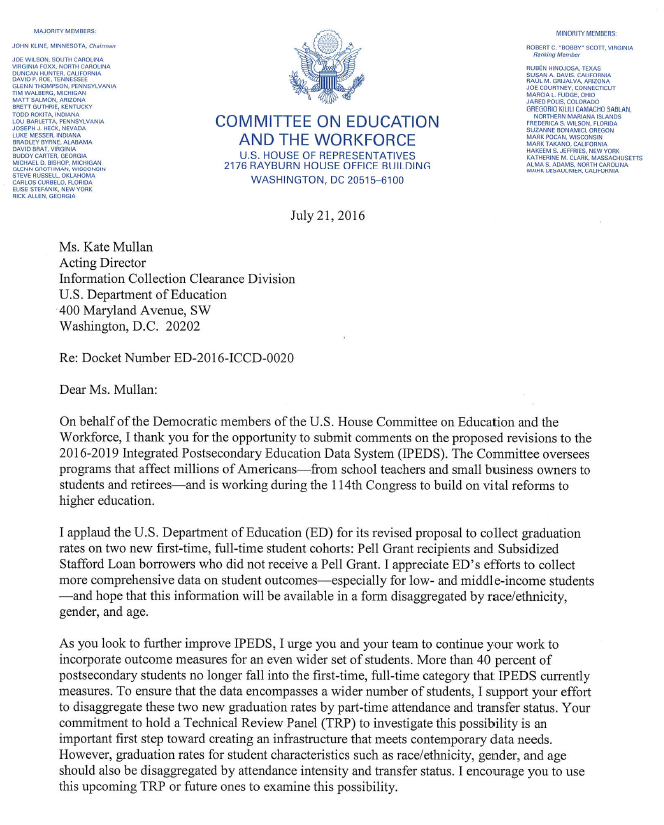
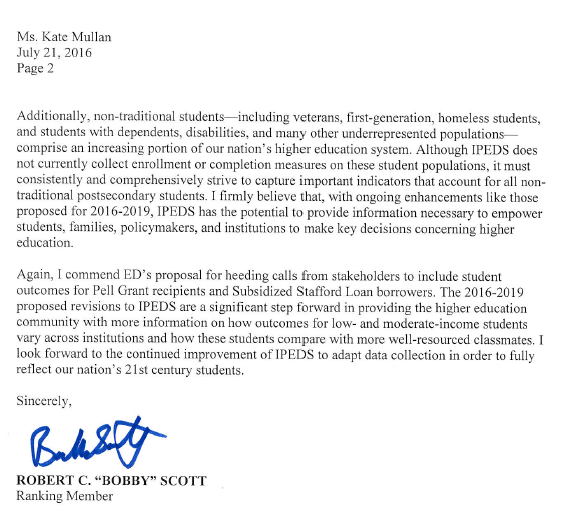
Response
Dear Mr. Scott,
Thank you for your letter posted on July 25, 2016, which responds to a 30-day request for comments on proposed changes to the Department of Education’s Integrated Postsecondary Education Data System (IPEDS) 2016-19. The National Center for Education Statistics (NCES) recognizes your comments to the Department’s proposed revisions for the IPEDS Graduation Rates survey component. We greatly appreciate your support of IPEDS’ efforts to collect information on graduation rates for Federal Pell Grant recipients and Unsubsidized Loan Recipients not receiving Pell Grants.
We also appreciate and have taken into consideration your suggestions for other ways in which the Department might expand the IPEDS collection on a variety of student populations, including nontraditional students. The proposed IPEDS changes that were submitted to the Office of Management and Budget relate to the collection of data that have already been described in the Higher Education Act (HEA), as amended, as well as based on several expert Technical Review Panel meetings held in the past. Although the Department agrees that the populations outlined in your letter are important, expansion of the collection beyond what is described in the HEA, as amended, to include information by race/ethnicity, gender, and age would require further technical investigation by NCES to determine the industry’s capacity to access, aggregate, and report the more detailed information.
While we continue to improve the IPEDS collection and take into consideration your suggestions for the future collections, the NCES Postsecondary Sample Surveys already collect helpful data that informs our understanding of these student populations. With the current suite of postsecondary data collections, it is NCES goal to work with higher education institutions and the research community to improve NCES’ ability to measure outcomes for all postsecondary education students.
Thank you again for your comments and interest in this proposal.
Richard J. Reeves
Postsecondary Branch Chief
Administrative Data Division
Comments related to OM
Comment number 82
Document: ED-2016-ICCD-0020-0082
Name: Jamey Rorison
This letter is submitted on behalf of the 22 undersigned members of the Postsecondary Data Collaborative (Postsec Data), in response to the revised proposal for the Integrated Postsecondary Data System (IPEDS) 2016-2019 collection.
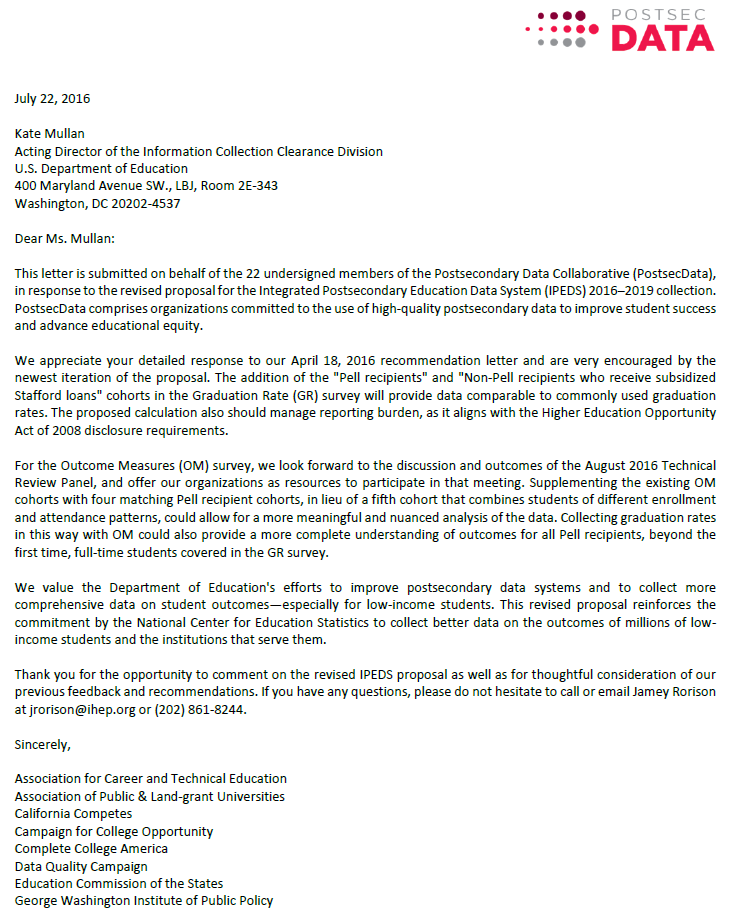
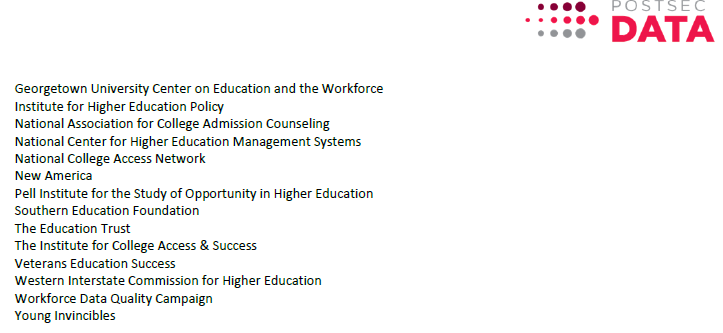
Response
Dear Mr. Rorison,
Thank you for your feedback received on July 22, 2016 responding to a 30-day request for comments on proposed changes to the Department of Education’s Integrated Postsecondary Education Data System (IPEDS) 2016-19. The National Center for Education Statistics (NCES) appreciates your interest in IPEDS. The Paperwork Reduction Act (PRA) provides an opportunity for an open and public comment period where comments on collections can be made. We are grateful for this process and your comment.
We thank you for submitting a comment on behalf of the 22 organizations, the Postsec Data. In your comments, we have received your membership’s support on the proposed changes to the Graduation Rates Survey to collect the HEA, as amended, required disclosures on Pell and Stafford loan graduation rates. Thank you also for your membership’s support of the upcoming IPEDS Technical Review Panel (TRP), which will allow a representative group of higher education institutions and data users to review all the proposed changes to the Outcome Measures survey including the issues brought forth in your comment (i.e., the disaggregation of the four Outcome Measures cohort by Pell status).
We thank you for taking the time to provide comments which will be carefully discussed at the upcoming TRP. A summary of the TRP will be publicly posted mid-to-late September before further final clarifications and instructions to the Outcome Measures survey can be provided to IPEDS data reporters.
Sincerely Yours,
Richard J. Reeves
Postsecondary Branch Chief
Administrative Data Division
Comments related to OM
Comment number 83
Document: ED-2016-ICCD-0020-0083
Name: Andrew Watt
Submitter’s Name: Nou Yang
Attached please find the comments on behalf of Capella University

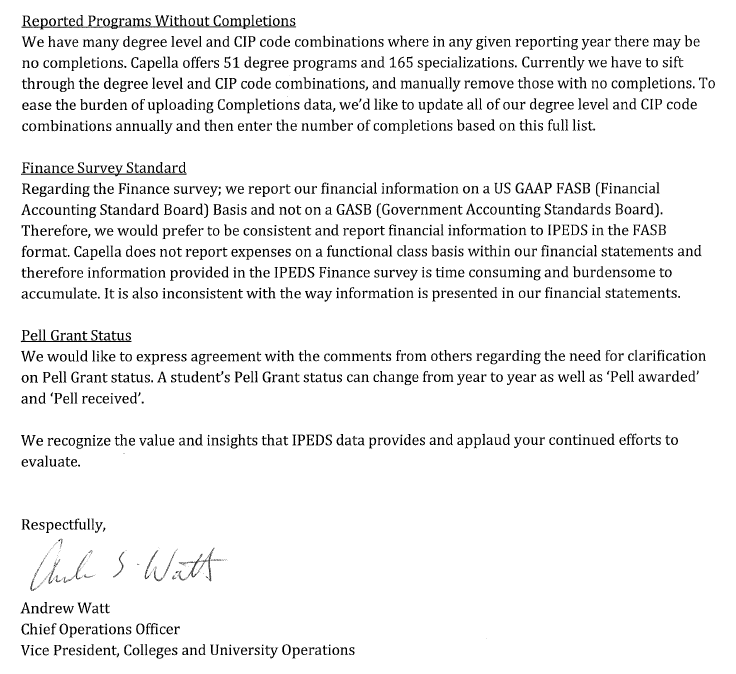
Response
Dear Mr. Watt,
Thank you for your feedback received on July 25, 2016 responding to a 30-day request for comments on proposed changes to the Department of Education’s Integrated Postsecondary Education Data System (IPEDS) 2016-19. The National Center for Education Statistics (NCES) appreciates your interest in IPEDS. The Paperwork Reduction Act (PRA) provides an opportunity for an open and public comment period where comments on collections can be made. We are grateful for this process and your comment.
We thank you for submitting a variety of comments considering the IPEDS data collection.
The cohort of first-time, full-time degree- or certificate-seeking students used in the collection of graduation rates data is required by the Student-Right-to-Know and Campus Security Act of 1990 (P.L. 101-542). The final 1999 SRK regulations (34 CFR 668.41, 34 CFR 668.45 and 34 CFR 668.48) require institutions to disclose the completion or graduation rate for first-time, full-time degree- or certificate-seeking undergraduate students who complete or graduate within 150 percent of the normal time for completion or graduation from their program. An institution that determines that its mission includes providing substantial preparation for students to enroll in another [Title IV, HEA] eligible institution is also required to disclose the transfer-out rate for its first-time, full-time, degree- or certificate-seeking undergraduate students who did not complete or graduate from their programs, but subsequently enrolled in another eligible program within 150 percent of the normal time for completion or graduation from their program.
In regard to the comment about CIP codes, NCES collects these codes from institutions to track the types of offerings from institutions. Although an institution may not have completions for a particular program in a given year, it is still important to provide information about the different programs that are offered in a given year, and where those programs are being offered. In addition, it allows NCES to provide data to students about programs that are available at a particular institution.
NCES also recognizes your recommendation to eliminate the reporting of financial data for FASB institutions by functional expense categories. However, institutions have been asked to report this way for many years, since at least the alignment of the FASB and GASB Finance forms in 2010-11, so there is no additional reporting burden on the institution. Additionally, NCES held Technical Review Panel #18 in order to improve comparability across versions of the IPEDS Finance survey. Requiring institutions to report using functional expense categories across both FASB and GASB standards was a determination made during this TRP to increase utility of the data collected.
Finally, in August, NCES has asked its contractors to hold an IPEDS Technical Review Panel (TRP), which will allow a representative group of higher education institutions and data users to review all the proposed changes to the Outcome Measures survey including the issues brought forth in your comment (i.e., Pell awarded versus Pell received).A summary of the TRP will be publicly posted mid-to-late September before further final clarifications and instructions to the Outcome Measures survey can be provided to IPEDS data reporters.
Sincerely Yours,
Richard J. Reeves
Postsecondary Branch Chief
Administrative Data Division
Comment related to OM (Comment number 87)
Document: ED-2016-ICCD-0020-0087
Name: Christine Keller
See attached letter
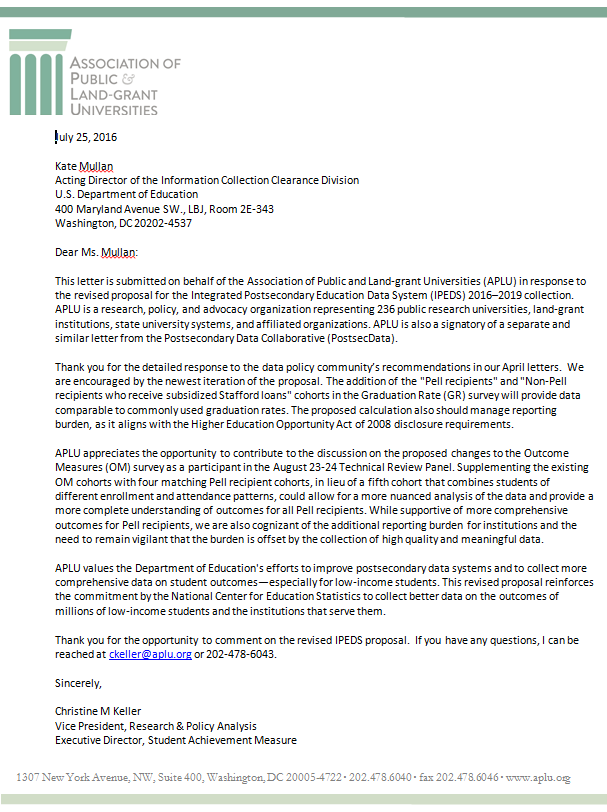
Response
Dear Ms. Keller,
Thank you for your feedback received on July 25, 2016 responding to a 30-day request for comments on proposed changes to the Department of Education’s Integrated Postsecondary Education Data System (IPEDS) 2016-19. The National Center for Education Statistics (NCES) appreciates your interest in IPEDS. The Paperwork Reduction Act (PRA) provides an opportunity for an open and public comment period where comments on collections can be made. We are grateful for this process and your comment.
We thank you for your support on the proposed changes to the Graduation Rates Survey to collect the HEA, as amended, required disclosures on Pell and Stafford loan graduation rates. Thank you also for your support of and participation in the upcoming IPEDS Technical Review Panel (TRP), which will allow a representative group of higher education institutions and data users to review all the proposed changes to the Outcome Measures survey including the issues brought forth in your comment (i.e., the disaggregation of the four Outcome Measures cohort by Pell status). We appreciate your important point that institutional burden should also be weighed in when making additional data collection changes.
We thank you for taking the time to provide comment, which will be carefully discussed at the upcoming TRP. A summary of the TRP will be publicly posted mid-to-late September before further final clarifications and instructions to the Outcome Measures survey can be provided to IPEDS data reporters.
Sincerely Yours,
Richard J. Reeves
Postsecondary Branch Chief
Administrative Data Division
Comment related to OM (Comment number 88)
Document: ED-2016-ICCD-0020-0088
Name: Kati Haycock
Please see comments from The Education Trust attached.

Response
Dear Ms. Haycock,
Thank you for your feedback received on July 25, 2016 responding to a 30-day request for comments on proposed changes to the Department of Education’s Integrated Postsecondary Education Data System (IPEDS) 2016-19. The National Center for Education Statistics (NCES) appreciates your interest in IPEDS. The Paperwork Reduction Act (PRA) provides an opportunity for an open and public comment period where comments on collections can be made. We are grateful for this process and your comment.
Thank you for your support on the proposed changes to the Graduation Rates survey to collect the HEOA disclosed Pell and Stafford loan graduation rates. We would like to make one point of clarification in response to your comment. The addition of collecting a sub-Pell group for each of the four Outcome Measures cohorts has not been finalized in the IPEDS collection because this proposed change still needs to be discussed at the upcoming IPEDS Technical Review Panel (TRP). At this meeting, a representative group of higher education institutions and data users will review and discuss all proposed changes to the Outcome Measures survey component, including your comment about disaggregating the four cohorts by a sub-Pell group. A summary from the TRP will be publicly posted mid-to-late September before further final clarifications and instructions to the Outcome Measures survey can be provided to IPEDS data reporters.
We thank you for taking the time to provide comment.
Sincerely Yours,
Richard J. Reeves
Postsecondary Branch Chief
Administrative Data Division
Comments related to OM (Duplicate comment numbers 89, 90, 91)
Document: ED-2016-ICCD-0020-0089
Duplicate Documents: ED-2016-ICCD-0020-0090 and ED-2016-ICCD-0020-0091
Name: Frank Balz
Please see the attached document regarding the proposal to add Pell Grant recipient cohorts to Integrated Postsecondary Data System (IPEDS) surveys.


Response
Dear Mr. Balz,
Thank you for your feedback received on July 25, 2016 responding to a 30-day request for comments on proposed changes to the Department of Education’s Integrated Postsecondary Education Data System (IPEDS) 2016-19. The National Center for Education Statistics (NCES) appreciates your interest in IPEDS. The Paperwork Reduction Act (PRA) provides an opportunity for an open and public comment period where comments on collections can be made. We are grateful for this process and your comment.
Thank you for your comment on the proposed change of adding a Pell Grant reporting requirement to both the Graduation Rates and Outcome Measures survey components. We would like to clarify that the proposed change of adding a Pell Grant reporting requirement is not duplicative to the NCES postsecondary sample surveys or the HEA, as amended, disclosures. Pell Grant outcomes are not available at the institutional level through the NCES postsecondary sample surveys. The HEA, as amended, disclosures for Pell and Stafford graduation rates are required to be posted on an institution’s website, but were never required to be reported in a central collection. Such information can be valuable to consumers, who may turn to U.S. Department of Education college products like College Navigator, College Scorecard, FAFSA, or Financial Aid Shopping Sheet.
However, your comment about bringing undue hardship to several of your membership’s smaller institutions has been taken seriously and will be a foremost consideration at the upcoming IPEDS TRP meeting as participants weigh the costs and benefits between institutional burden and gathering important institutional data that will be made publicly available.
A summary from the TRP will be publicly posted mid-to-late September before further final clarifications and instructions to the Outcome Measures survey can be provided to IPEDS data reporters.
We thank you for taking the time to provide comment.
Sincerely Yours,
Richard J. Reeves
Postsecondary Branch Chief
Administrative Data Division
Comments related to OM and Finance
Comment number 81
Document: ED-2016-ICCD-0020-0081
Name: Sam Stanley
Submitter’s Representative: Braden J. Hosch
Organization: Stony Brook University
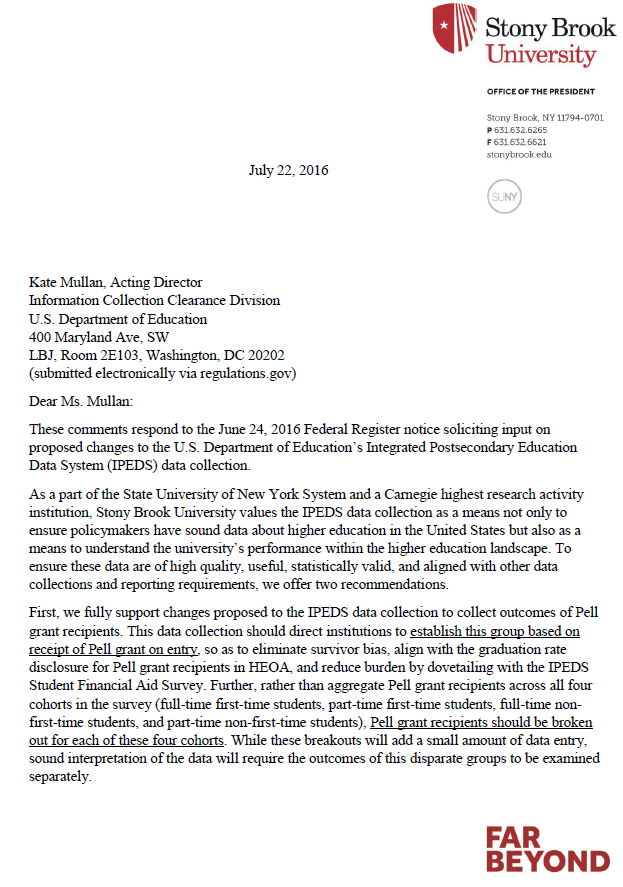

Duplicate comment numbers 85 and 86
Document: ED-2016-ICCD-0020-0085
Duplicate Document: ED-2016-ICCD-0020-0086
Name: Antoinette Flores
See attached file(s)
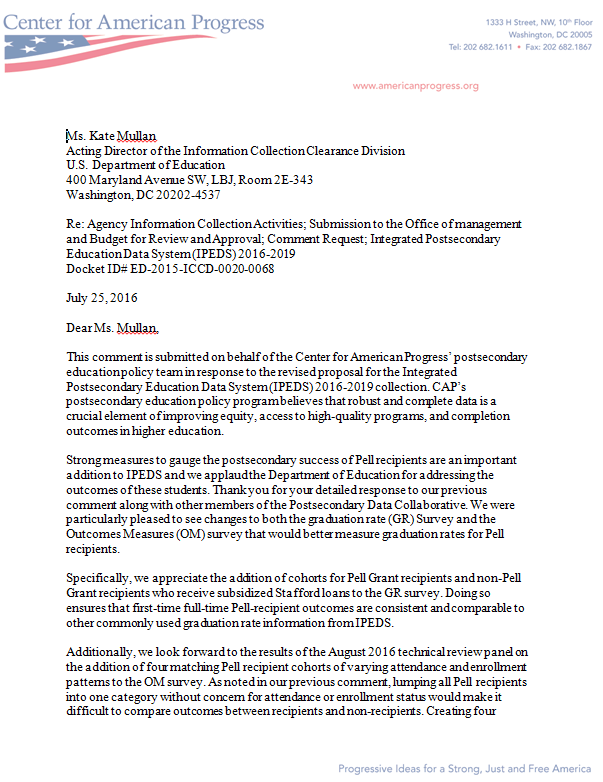
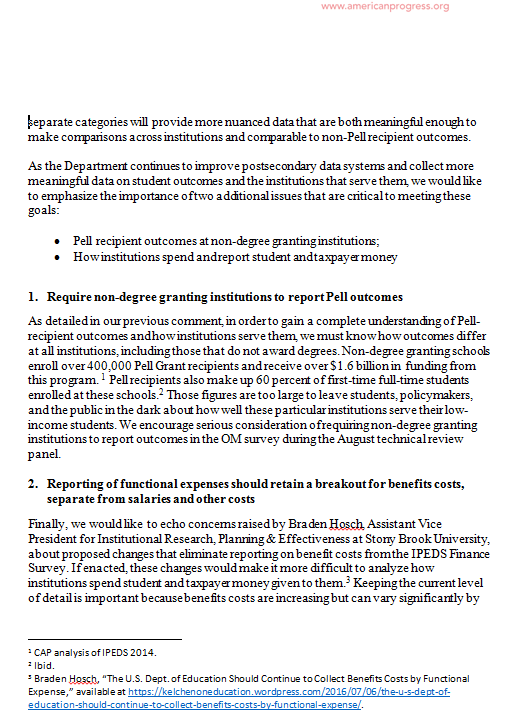
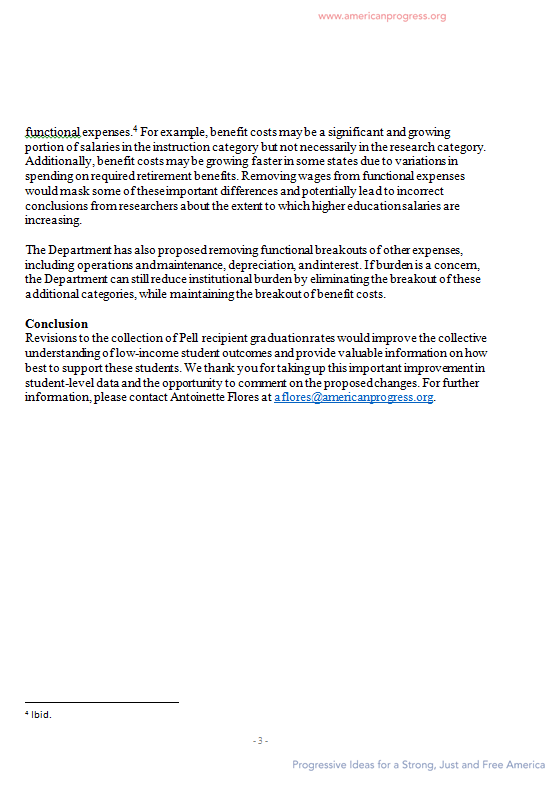
Response
Dear Dr. Stanley Jr. and Ms. Flores,
Thank you for your feedback received on July 22 and 25, 2016 responding to a 30-day request for comments on proposed changes to the Department of Education’s Integrated Postsecondary Education Data System (IPEDS) 2016-19. The National Center for Education Statistics (NCES) appreciates your interest in IPEDS. The Paperwork Reduction Act (PRA) provides an opportunity for an open and public comment period where comments on collections can be made. We are grateful for this process and your comment.
Thank you for your institution’s respective support of the NCES proposal to collect information on Pell Grant recipients and of the proposed changes to the Graduation Rates survey to collect the HEOA disclosed Pell and Stafford loan graduation rates. We would like to make a couple of points of clarification in response to your comments. The addition of collecting a sub-Pell group for each of the four Outcome Measures cohorts has not been finalized in the IPEDS collection because this proposed change still needs to be discussed at the upcoming IPEDS Technical Review Panel (TRP). At this meeting, a representative group of higher education institutions and data users will review and discuss all proposed changes to the Outcome Measures survey component, including the issues brought forth in your comments (i.e., Pell at entry and the disaggregation of the four Outcome Measures cohort by Pell status; and whether non-degree-granting should be required to complete Outcome Measures survey). A summary of the TRP will be publicly posted mid-to-late September before further final clarifications and instructions to the Outcome Measures survey can be provided to IPEDS data reporters.
NCES also recognizes your recommendation to maintain the breakout of benefits expense separate from salaries and wages and total expenses on the Finance survey component. However, we will continue with our proposal to eliminate the collection of the details for the benefit expenses. You mentioned that the collection of the detailed benefit expenses will not place additional burden on institutions for the listed reasons above, namely that public and not-for-profit institutions have been reporting this way since FY 2002-03. However, beginning with FY 2014, for-profit institutions have been asked to report the same detailed expenses - including benefits broken out by functional classifications - based on recommendations of the IPEDS Technical Review Panel #39, Improving Finance Survey Forms for For-Profit Institutions.
NCES believes that many for-profit institutions lack the capacity to generate these data. We agree that the burden will be minimal for larger, well-resourced institutions but believe that smaller, under-resourced institutions will not have the same capacity for reporting. Also, in the 2015-16 data collection (preliminary data), out of the 7,277 Title IV institutions that reported IPEDS, 2,491 institutions were non-degree-granting, and it is these smaller non-degree-granting institutions that will not have a system for reporting the detail of benefit expenses.
Additionally, while benefit expenses comprise approximate 1/6 of total expenses at public GASB and private, not-for-profit FASB institutions, they make up less than 1/10 of total expenses at private, for-profit FASB institutions, which represent over 3,000 data reporters in the IPEDS collection. Because IPEDS already asks institutions to report total benefit expenses and this figure makes up a small percentage of total expenses for over 3,000 of our reporting institutions, we do not recognize a need to ask for the detail benefit expenses. Again, we thank you for the feedback.
Finally, since we are still collecting the totals for the natural classification expense categories (e.g., total benefits), the Finance data will continue to provide taxpayers and private philanthropies/endowments with sufficient information to determine institutional finances. The removal of the detail benefits information is due to discussion – during the IPEDS Technical Review Panel #46, Improvements to the Finance Survey – that cost allocations are subjective and may lead to detailed expense categories being incomparable across institutions. In order to promote the collection and use of accurate and reliable data, NCES has determined it best to remove the detail category expenses.
We thank you for taking the time to provide comment in an effort to improve the data collection.
Sincerely Yours,
Richard J. Reeves
Postsecondary Branch Chief
Administrative Data Division
Comments related to OM and GR
Comment number 78
Document: ED-2016-ICCD-0020-0078
Name: Lindsay Ahlman
TICAS comments attached
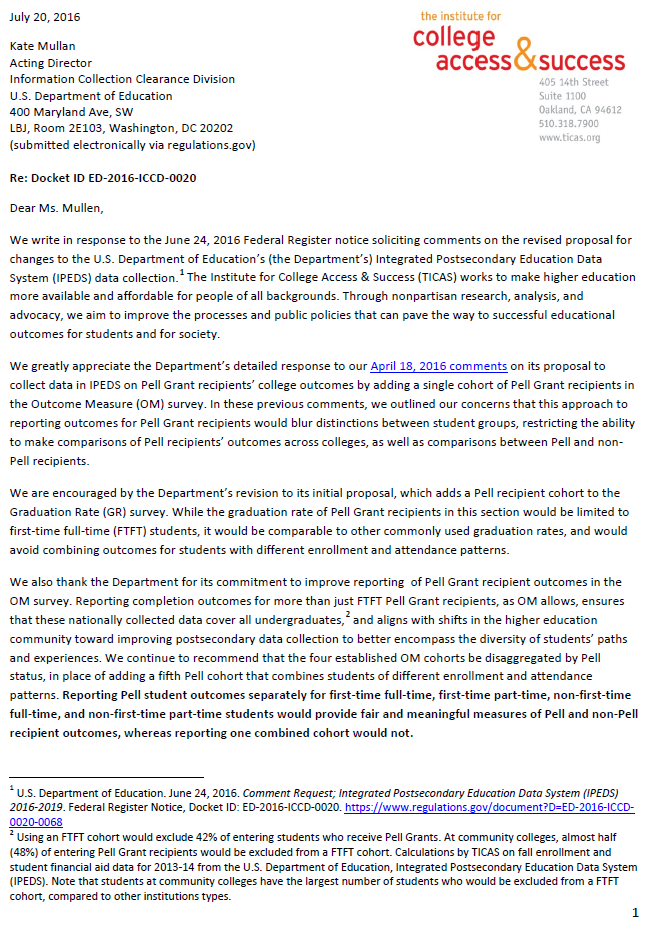
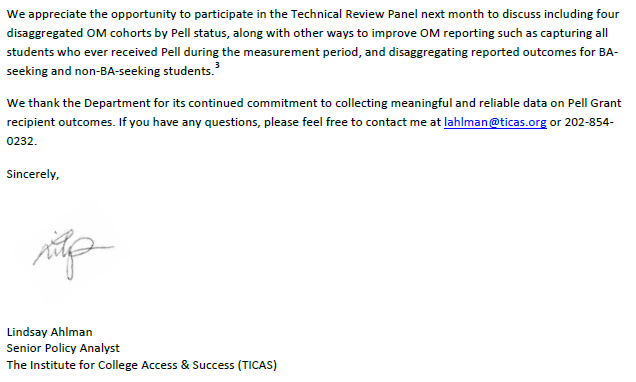

Response
Dear Ms. Ahlman,
Thank you for your feedback received on July 20, 2016 responding to a 30-day request for comments on proposed changes to the Department of Education’s Integrated Postsecondary Education Data System (IPEDS) 2016-19. The National Center for Education Statistics (NCES) appreciates your continued interest in IPEDS. The Paperwork Reduction Act (PRA) provides an opportunity for an open and public comment period where comments on collections can be made. We are grateful for this process and your comment.
We thank you for recognizing and supporting the changes of adding the collection of Pell and Stafford loan disclosures to the Graduation Rates survey based on the 60-day comments. We also thank you for supporting and attending the upcoming IPEDS Technical Review Panel (TRP) meeting, which will discuss the various proposed changes to the Outcome Measures survey. Your comment of disaggregating the four established Outcome Measures survey cohorts by Pell is one of the changes to be discussed at the August TRP.
A summary of the TRP will be publicly posted mid-to-late September before further final clarifications and instructions to the Outcome Measures survey can be provided to IPEDS data reporters. Thank you again for your comment.
Sincerely Yours,
Richard J. Reeves
Postsecondary Branch Chief
Administrative Data Division
Comment related to changes to Finance
Comment number 74
Document: ED-2016-ICCD-0020-0074
Name:
Anonymous Anonymous
Transparency is important and necessary. We need to know more about spending for colleges and universities, not less reporting of functional expenses should retain a breakout for benefits costs, separate from salaries and other costs. It allows more flexibility to report the individual items that are meaningful to taxpayers and private philanthropies/ endowments. Burden to institutions to continue this reporting is minimal, since a) they report these costs now and b) the costs are actual and do not require complex allocation procedures, and c) they must maintain expense data to report total benefits costs.
Comment number 77
Document: ED-2016-ICCD-0020-0077
Name:
Joseph McDonald
The National Center for Education Statistics should modify its data collection plan to retain breakouts for benefits costs in addition to salary costs for all functional expense categories. I
Response
To Whom It May Concern,
Thank you for your feedback dated July 7 and 18, 2016, responding to a request for comments on proposed changes to the Department of Education’s Integrated Postsecondary Education Data System (IPEDS) published in the Federal Register. The National Center for Education Statistics (NCES) appreciates your interest in IPEDS. The Paperwork Reduction Act (PRA) provides an opportunity for an open and public comment period where comments on collections can be made. We are grateful for this process and your comment.
NCES recognizes your recommendation to maintain the breakout of benefits expense separate from salaries and wages and total expenses on the Finance survey component. However, we will continue with our proposal to eliminate the collection of the details for the benefit expenses. Beginning with FY 2014, for-profit institutions have been asked to report the same detailed expenses - including benefits broken out by functional classifications - based on recommendations of the IPEDS Technical Review Panel #39, Improving Finance Survey Forms for For-Profit Institutions.
NCES believes that many for-profit institutions lack the capacity to generate these data. We agree that the burden will be minimal for larger, well-resourced institutions but believe that smaller, under-resourced institutions will not have the same capacity for reporting. Also, in the 2015-16 data collection (preliminary data), out of the 7,277 Title IV institutions that reported IPEDS, 2,491 institutions were non-degree-granting, and it is these smaller non-degree-granting institutions that will not have a system for reporting the detail of benefit expenses.
Additionally, while benefit expenses comprise approximate 1/6 of total expenses at public GASB and private, not-for-profit FASB institutions, they make up less than 1/10 of total expenses at private, for-profit FASB institutions, which represent over 3,000 data reporters in the IPEDS collection. Because IPEDS already asks institutions to report total benefit expenses and this figure makes up a small percentage of total expenses for over 3,000 of our reporting institutions, we do not recognize a need to ask for the detail benefit expenses.
Finally, since we are still collecting the totals for the natural classification expense categories (e.g., total benefits), the Finance data will continue to provide taxpayers and private philanthropies/endowments with sufficient information to determine institutional finances. The removal of the detail benefits information is due to discussion – during the IPEDS Technical Review Panel #46, Improvements to the Finance Survey – that cost allocations are subjective and may lead to detailed expense categories being incomparable across institutions. In order to promote the collection and use of accurate and reliable data, NCES has determined it best to remove the detail category expenses.
Sincerely Yours,
Richard J. Reeves
Postsecondary Branch Chief
Comment related to error messages
Comment number 73
Document: ED-2016-ICCD-0020-0073
Name: John Nugent
Is it possible to sharpen up the algorithm that triggers an "error" or "fatal error" message for large percentage changes based on very small n's? We frequently get these messages when, for example, our number of part-time graduate students changes from 2 to 1 from one year to the next. This *is* a 100% year-over-year change, but obviously it's due to random variation as opposed to data-entry error or major shifts in policy or practice at our institution.
Response
Dear Mr. Nugent,
Thank you for your feedback posted on July 5, 2016 responding to a 30-day request for comments on proposed changes to the Department of Education’s Integrated Postsecondary Education Data System (IPEDS) 2016-19. The National Center for Education Statistics (NCES) appreciates your interest in IPEDS. The Paperwork Reduction Act (PRA) provides an opportunity for an open and public comment period where comments on collections can be made. We are grateful for this process and your comment.
We review the errors each year to improve the utility of the system. Over time, we have tightened a number of errors so that they trigger less frequently. We focus on the errors that cause the most issues for users, and use feedback from our quality control reports and the IPEDS Help Desk to help us decide which errors to focus on during review. We plan to continue improving these errors to improve both the experience of data providers and the quality of the data.
Sincerely Yours,
Richard J. Reeves
Postsecondary Branch Chief
Comments related to changes to Academic Libraries
Comment number 80
Document: ED-2016-ICCD-0020-0080
Name: Anonymous Anonymous
Hello-
About the definition for "Total Physical Circulation" in the Academic Libraries Survey: In the fourth sentence ("Include transactions of books and media.") do you mean "volumes" instead of "books"? For example, should serial and bound music use be included? Thank you
Response
Dear Anonymous,
Thank you for your feedback received on July 25, 2016 responding to a 30-day request for comments on proposed changes to the Department of Education’s Integrated Postsecondary Education Data System (IPEDS) 2016-19. The National Center for Education Statistics (NCES) appreciates your continued interest in IPEDS. The Paperwork Reduction Act (PRA) provides an opportunity for an open and public comment period where comments on collections can be made. We are grateful for this process and your comment.
Thank you for submitting your comment requesting clarification about books versus volumes in the collecting of total physical circulation. In response to your comment, NCES asks that institutions report books by item (e.g. volumes) when counting physical circulation transactions. Each volume is a physical item and usually has its own bar code (or some assigned identifying factor) to make it distinctive from another volume. Physical “volumes” include books, media (DVDs, etc.), serials (e.g. bounded), and music scores. NCES will provide a frequently asked question (FAQ) on the Academic Libraries (AL) survey materials to provide clarification on the circulation of books and other materials for reporting physical circulation. We believe that providing the clarifications discussed above should provide improved accuracy and quality of the data being reported. Thank you again for your question and feedback.
Sincerely Yours,
Richard J. Reeves
Postsecondary Branch Chief
Administrative Data Division
Comment related to dropouts
Comment number 84
Document: ED-2016-ICCD-0020-0084
Name: Harold Huggins
Organization: Council for Education
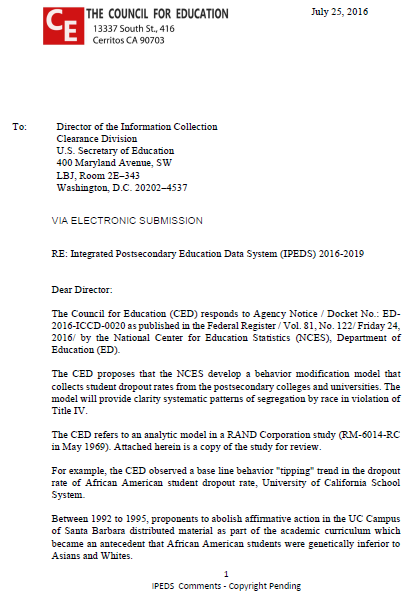
Response
Thank you for your feedback received on July 25, 2016 responding to a 30-day request for comments on proposed changes to the Department of Education’s Integrated Postsecondary Education Data System (IPEDS) 2016-19. The National Center for Education Statistics (NCES) appreciates your interest in IPEDS. The Paperwork Reduction Act (PRA) provides an opportunity for an open and public comment period where comments on collections can be made. We are grateful for this process and your comment.
IPEDS is an administrative level data collection, collecting data at the aggregate level from institutions. The collection proposed would not fit in to the institution level data collection. IPEDS does, however, collect a number of outcomes that may be useful in understanding trends in relation to completion and transfer patterns of students in the Graduation Rates and Outcome Measures components.
Sincerely Yours,
Richard J. Reeves
Postsecondary Branch Chief
Administrative Data Division
| File Type | application/vnd.openxmlformats-officedocument.wordprocessingml.document |
| Author | Jones, Gigi |
| File Modified | 0000-00-00 |
| File Created | 2021-01-24 |
© 2026 OMB.report | Privacy Policy
